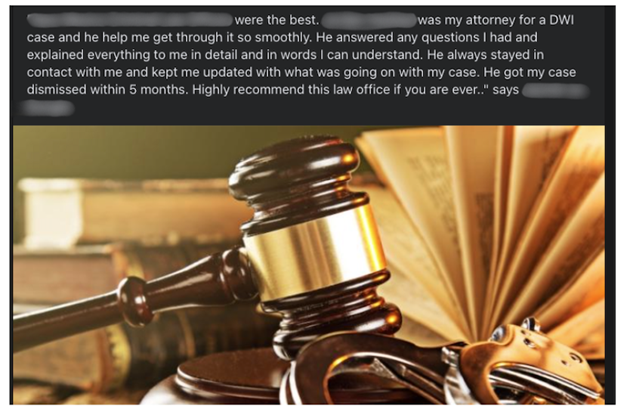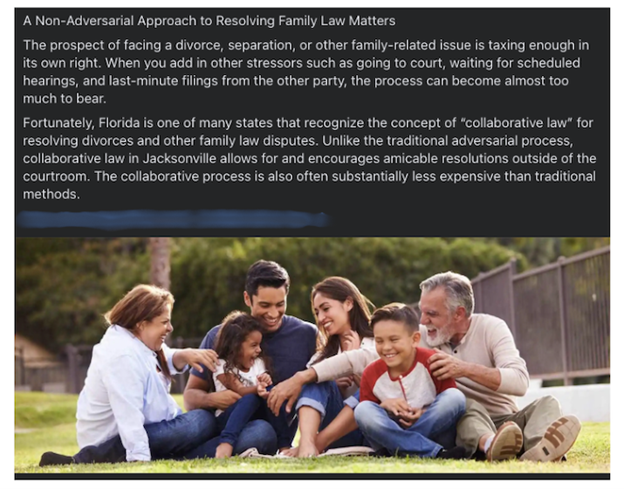A strong online presence is crucial for law firms in the digital era. More than ever, social media is critical to reaching potential clients, demonstrating your experience, and building trust.
At Juris Digital, we specialize in crafting targeted social media strategies that resonate within the legal industry. Our approach ensures your firm doesn’t just appear online but stands out above the rest.
This post will take a deep dive into everything you want to know about law firm social media. We’ll talk about the importance of tailoring your strategy across different practice areas, how to craft posts that genuinely engage with potential clients, and how to look for key performance indicators (KPIs) that matter. Step by step, let’s unlock the full potential of developing a law firm social media strategy.
Developing a Social Media Strategy for Law Firms
Crafting a social media strategy for a law firm requires a nuanced understanding that one size does not fit all, especially in different practice areas. Each area of law speaks to a distinct audience with unique concerns and needs, influencing the platform and content you share.
Family Law
Engaging with potential clients in family law means addressing sensitive, personal matters. Platforms like Facebook and Instagram, where users seek connection and community, are ideal. Content should be compassionate and supportive, offering advice and insights on navigating difficult times like divorce or custody disputes. Sharing stories of positive outcomes and how your firm supports families during transitions can resonate deeply.
Personal Injury Law
For personal injury, your audience seeks hope and assurance during a challenging period of their lives. Utilizing platforms such as Facebook for storytelling—showcasing client testimonials and explaining the legal process in layperson’s terms—helps demystify legal proceedings and builds trust. LinkedIn can also be a valuable platform for sharing success stories and professional accolades, appealing to referral sources like medical professionals or fellow attorneys.
Don’t gloss over TikTok and Instagram marketing for lawyers. Instagram isn’t just about sharing photos and videos, and TikTok isn’t just posting about funny dances. Many users turn to Instagram and TikTok as a search engine. It’s estimated that 40% of consumers now use TikTok to search for information.
Corporate Law
Corporate law clients seek expertise and professionalism. LinkedIn is the prime platform for this audience, where content can focus on industry insights, regulatory changes, and case studies highlighting the firm’s proficiency in navigating complex legal landscapes for businesses. Sharing content that showcases thought leadership—such as white papers or articles on current corporate legal trends—will engage this more technical and professional audience.
Criminal Law
Engagement on platforms like X (formerly Twitter) and Facebook can be effective in criminal law. Content should focus on your expertise, significant case victories, and insights into criminal law trends. This approach demonstrates your firm’s capabilities and educates your audience on their rights and the complexities of the legal system. Engaging in legal discussions and providing clear, concise advice can establish your firm as a thought leader in the criminal law sector.
Types of Posts That Drive Engagement
Law firms must diversify their social media content to engage with their audience effectively, no matter the practice area. Examples include the following.
1. Educational content. Provide clear, accessible legal information. Educational content that simplifies complex legal topics or updates on industry trends can position your firm as a knowledgeable authority and attract engagement from those seeking legal insight. Resharing blog posts on important issues can be a great way to offer educational content.

2. Success stories. Sharing anonymized success stories or client testimonials can create a narrative of trust and proficiency. This type of content illustrates your firm’s success and humanizes the legal process for potential clients, encouraging them to envision positive outcomes for their own situations.

3. Behind-the-scenes. Revealing the day-to-day workings of your firm and its culture can significantly boost engagement. This approach allows audiences to connect with your firm personally, fostering trust and loyalty.

4. Community engagement. Showcasing your firm’s involvement in local events or pro bono work highlights your commitment to community service. Content demonstrating social responsibility and community involvement resonates with audiences, potentially enhancing your firm’s reputation and appeal.

Integrating these posts into your social media strategy can elevate your firm’s online presence and help you connect more effectively with existing and potential clients.
Tailoring Your Posts to Different Legal Practice Areas
Using these general types of content as a guide, you can tailor posts to your specific practice area. For example, consider social media for a personal injury law firm. Use Facebook and Instagram to share explainer videos on common personal injury questions or infographics on what to do after an accident. Highlight success stories through short video testimonials or image-based posts summarizing a case’s outcome while maintaining client confidentiality. These platforms are ideal for reaching individuals in a more personal, engaging manner, especially after they’ve experienced trauma.

For a family law firm, consider Facebook posts that offer sincere guidance on navigating divorce, custody, or co-parenting. These posts can resonate with individuals seeking support. Instagram stories highlighting community events or Q&A sessions on family law topics can also build a sense of community and approachability. Be sure to add stories to your “highlights” so people can view them if they find your account later.

X, formerly known as Twitter, is a powerful tool for sharing quick updates on law changes, rights under the law, or commentary on high-profile cases, given its real-time nature. LinkedIn articles can delve into a deeper analysis of defense strategies, appealing to a professional audience that values expertise and insight into criminal law.

The Importance of Creating Genuine Posts
When sharing success stories or discussing complex legal topics, aim to connect on a human level with the reader. Instead of merely stating a case win, share the journey, emphasizing the client’s challenge and how your firm navigated to a successful resolution. Posts that come across as arrogant, salesy, or overly complex can turn off potential clients.
Engagement strategies are the lifeblood of genuine interaction in social media. Always respond to comments with thoughtful, personalized replies. This practice shows that you value your audience’s input and encourages a community atmosphere. Creating interactive content, such as polls about common legal misconceptions or Q&A sessions, invites your audience to actively participate and fosters a two-way conversation. Look for ways to engage your audience further rather than just tell them to contact you to hire a lawyer.
Key Performance Indicators (KPIs) to Monitor
Tracking the right KPIs is crucial to effectively measure the success of your law firm’s social media efforts. Here’s a breakdown of some key metrics:
- Engagement rates measure the level of interaction with your content through likes, shares, and comments, and high engagement rates indicate content resonates well with your audience;
- Follower growth monitors your content’s appeal, the increase in social media followers over time, and brand awareness;
- Website traffic tracks the number of visitors to your firm’s website from social media links and is a key indicator of how effectively your social media drives potential clients to you;
- Lead generation is the number of inquiries via social media—this metric shows how well your social media converts interest into potential client engagement; and
- Conversion rates are the percentage of social media followers who become clients.
Monitoring these KPIs helps refine your social media strategy, ensuring you invest in content and platforms that yield the best returns for your firm. Unsure where to track some of your social media metrics? If you aren’t using a dedicated legal marketing agency for your social media needs, consider programs such as Hootsuite and SproutSocial. You can track website source traffic in Google Analytics and call leads through CallRail.
Tips for Lawyers Starting Out on Social Media
If you’re going to become active on social media, you should put your total effort into it. You don’t have to be active on every platform; you just have to be where your potential clients are. Here are some tips for law firms when developing a social media presence.
Understand Your Audience
Create personas for your typical clients based on demographic data, legal needs, and communication preferences. Tailor your content to address their specific concerns and interests. Put yourselves in the shoes of the audience you are trying to reach when you’re thinking about posts.
Post Consistently
Use scheduling tools to maintain a regular posting calendar or hire a social media manager. Aim for a mix of daily business updates, weekly in-depth articles, and real-time interactions to keep your audience engaged. Not posting for weeks or months can lead potential clients to wonder if you’re still in business.
Invest in Branding
Develop a cohesive visual style for your social media content, including a color scheme, font choices, and a logo placement strategy. Use design tools to create consistent and recognizable branding across all posts.
Engage Your Audience
Respond actively to comments and messages. Host Q&A sessions or live discussions to foster a two-way conversation. Highlight your community’s contributions to show appreciation for their engagement.
Don’t Sell Yourself in Every Post
Gone are the days when it’s necessary to go for the hard sell in every social media post. Consumers are looking for personality and genuineness. You’re dealing with people who may be going through one of the worst experiences of their lives. Be empathetic and relatable.
Remember, SEO Applies to Social Media
Don’t forego SEO best practices in your law firm’s social media strategy. Use hashtags on Instagram and LinkedIn and consider SEO search terms for TikTok. You want to optimize your content so that people who are not following you can discover you. Having keywords in your profile can also help.
Know Your Goals
Clearly define your social media presence goals, such as increasing brand awareness, driving website traffic, or generating leads. Set specific, measurable objectives for each platform. Consider social media ads to reach a wider, more targeted audience.
Measure Your Goals
Regularly review your social media analytics to track progress towards your goals. Adjust your strategy based on what the data shows about your content’s performance and audience behavior.
Posting social media without any understanding of what works is a huge wasted opportunity. If you’re going to invest the time and resources into social media, you need to track metrics. Social media involves a lot of trial and error. What works for a personal injury firm in one geographic market might not work for someone else in a different part of the country. Success doesn’t happen overnight, which leads some firms to give up on social media prematurely because they don’t see immediate results.
Related: Why “Beating Your Competition” Is an Awful Marketing Goal
Biggest Mistakes that Can Cause a Drop in Engagement
When it comes to social media, there are plenty of opportunities to get it wrong. Avoiding some of the most common mistakes can help you develop better posting habits.
Not Responding to Comments
Failure to respond to comments is a big mistake, no matter your practice area. Almost 48% of legal consumers surveyed in a 2022 study said that attorney responsiveness is the main factor when choosing a lawyer. Not responding to comments can cost you potential clients and turn off others down the line.
Not Using the Right Social Media Platform for Your Practice Area
Everyone is on Facebook, so you might concentrate all your efforts there, but maybe your potential audience is elsewhere. LinkedIn is becoming a popular platform for many seeking content. According to Hootsuite, 40% of LinkedIn visitors organically engage with a page every week. For businesses that post weekly, pages often see more than a five-fold increase in followers.
Hashtags can help you reach non-followers, but it’s important you tailor them to your practice area and don’t overuse them. You don’t want to spam people or make your content look unprofessional. Skip overly broad ones such as #lawyer or #lawfirm.
Too Much Self-Promotion or Being Spammy
Don’t always post information about yourself or the firm. You want to provide educational value to your followers. You have the opportunity to reach potential clients who might not need your services now—but might at some point. Always going for self-promotion posts can lead to a drop in engagement and followers.
Contact Juris Digital for Your Law Firm Social Media Needs
As a legal professional, you might’ve previously assumed the terms lawyer and social media were incompatible. However, you couldn’t be more wrong. In 2022, 89% of lawyers surveyed in an ABA Legal Technology Survey Report said their firms had a social media presence, and that number is likely higher today.
With most law firms on social media, standing out in your practice area is even more critical. Creating a dynamic social media strategy that resonates with your audience and effectively grows your law firm’s online presence requires skill and precision. One of the best ways to do this is by hiring industry experts to help you reach your target audience.
At Juris Digital, we stand ready to propel your social media efforts to new heights. If you’re ready to elevate your law firm’s social media strategy, contact us to discuss how we can tailor a social media management plan that aligns with your firm’s unique goals.
